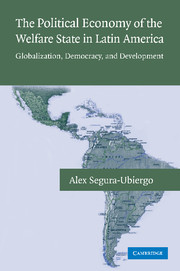 The Political Economy of the Welfare State in Latin America
The Political Economy of the Welfare State in Latin America Book contents
- Frontmatter
- Contents
- Tables and Figures
- Acknowledgments
- 1 Introduction
- 2 The Historical Evolution of Welfare Systems in Latin America: Qualitative Comparative Analysis
- 3 Theoretical Framework and Main Hypotheses
- 4 Determinants of Social Spending in Latin America: A Time-Series Cross-Section Analysis, 1973–2003
- 5 Chile: A Classic Latin American Welfare State under Authoritarian Stress (1973–1989) and Democratic Reinvention (1990–2000)
- 6 Costa Rica: Globalization, Gradual Reform, and the Politics of Compensation, 1973–2002
- 7 Peru: Political Instability, Regime Change, and Late Economic Reform in a Non-Welfare State, 1973–2000
- 8 Conclusion: Summary and Final Reflections on the Sustainability and Effectiveness of Latin American Welfare Systems
- Bibliography
- Index
7 - Peru: Political Instability, Regime Change, and Late Economic Reform in a Non-Welfare State, 1973–2000
Published online by Cambridge University Press: 10 July 2009
- Frontmatter
- Contents
- Tables and Figures
- Acknowledgments
- 1 Introduction
- 2 The Historical Evolution of Welfare Systems in Latin America: Qualitative Comparative Analysis
- 3 Theoretical Framework and Main Hypotheses
- 4 Determinants of Social Spending in Latin America: A Time-Series Cross-Section Analysis, 1973–2003
- 5 Chile: A Classic Latin American Welfare State under Authoritarian Stress (1973–1989) and Democratic Reinvention (1990–2000)
- 6 Costa Rica: Globalization, Gradual Reform, and the Politics of Compensation, 1973–2002
- 7 Peru: Political Instability, Regime Change, and Late Economic Reform in a Non-Welfare State, 1973–2000
- 8 Conclusion: Summary and Final Reflections on the Sustainability and Effectiveness of Latin American Welfare Systems
- Bibliography
- Index
Summary
This chapter studies the evolution of the Peruvian welfare system from the mid-1970s to the late 1990s. The case of Peru also provides further evidence to identify some of the key causal mechanisms underlying the main statistical relationships analyzed in Chapter 4 through regression analysis and studied in more detail through qualitative analysis in Chapters 5 and 6. First, Peru reinforces two key insights developed in the case study of Chile. The first is that fast and radical trade liberalization hurts domestic producers and shifts the structure of employment toward sectors where workers typically accumulate lower welfare entitlements (i.e., the informal sector and the service sector). This is one of the most important mechanisms through which greater integration into international trade markets is associated with lower levels of social spending – especially social security expenditures. Unlike in Costa Rica, where there is a much greater dispersion of political power, Pinochet in Chile and Fujimori in Peru concentrated executive authority to such an extent that they could overcome practically all resistance to their policies of trade liberalization and labor market flexibilization.
Second, the Peruvian case also shows that a process of democratization in the absence of a prior history of continuous democracy can have a weaker effect on social welfare expansion than a process of democratization in a country with a longer democratic tradition. This is not intuitively obvious.
- Type
- Chapter
- Information
- The Political Economy of the Welfare State in Latin AmericaGlobalization, Democracy, and Development, pp. 229 - 258Publisher: Cambridge University PressPrint publication year: 2007


